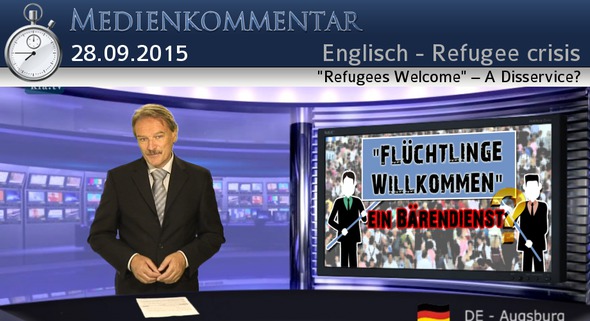Politics (English)
"Refugees Welcome" – A Disservice?
28.09.2015
Subtitle "Afrikaans" was produced by machine.Subtitle "አማርኛ" was produced by machine.Subtitle "العربية " was produced by machine.Subtitle "Ārāmāyâ" was produced by machine.Subtitle "azərbaycan dili " was produced by machine.Subtitle "беларуская мова " was produced by machine.Подзаглавието "България" е създадено от машина.Subtitle "বাংলা " was produced by machine.Subtitle "བོད་ཡིག" was produced by machine.Subtitle "босански" was produced by machine.Subtitle "català" was produced by machine.Subtitle "Cebuano" was produced by machine.Subtitle "ગુજરાતી" was produced by machine.Subtitle "corsu" was produced by machine.Podtitul "Čeština" byl vytvořen automaticky.Subtitle "Cymraeg" was produced by machine.Subtitle "Dansk" was produced by machine.Untertitel "Deutsch" wurde maschinell erzeugt.Subtitle "Untertitel" was produced by machine.Subtitle "Ελληνικά" was produced by machine.Subtitle "English" was produced by machine.Subtitle "Esperanto" was produced by machine.El subtítulo "Español" se generó automáticamente.Subtitle "Eesti" was produced by machine.Subtitle "euskara" was produced by machine.Subtitle "فارسی" was produced by machine.Subtitle "Suomi" was produced by machine.Le sous-titre "Français" a été généré automatiquement.Subtitle "Frysk" was produced by machine.Subtitle "Gaeilge" was produced by machine.Subtitle "Gàidhlig" was produced by machine.Subtitle "Galego" was produced by machine.Subtitle "Schwizerdütsch" was produced by machine.Subtitle "هَوُسَ" was produced by machine.Subtitle "Ōlelo Hawaiʻi" was produced by machine.Subtitle "עברית" was produced by machine.Subtitle "हिन्दी" was produced by machine.Subtitle "Mẹo" was produced by machine.Subtitle "Hrvatski" was produced by machine.Subtitle "Kreyòl ayisyen " was produced by machine.Subtitle "Magyar" was produced by machine.Subtitle "Հայերեն" was produced by machine.Subtitle "Bahasa Indonesia " was produced by machine.Subtitle "Asụsụ Igbo " was produced by machine.Textun"Íslenska" var framkvæmt vélrænt.Sottotitoli "Italiano" sono stati generati automaticamente.字幕は"日本語" 自動的に生成されました。Subtitle "Basa Jawa" was produced by machine.Subtitle "ქართული" was produced by machine.Subtitle "қазақ тілі " was produced by machine.Subtitle "ភាសាខ្មែរ" was produced by machine.Subtitle "ಕನ್ನಡ" was produced by machine.Subtitle "한국어" was produced by machine.Subtitle "कोंकणी語" was produced by machine.Subtitle "کوردی" was produced by machine.Subtitle "Кыргызча" was produced by machine.Subtitle " lingua latina" was produced by machine.Subtitle "Lëtzebuergesch" was produced by machine.Subtitle "Lingala" was produced by machine.Subtitle "ພາສາ" was produced by machine.Subtitle "Lietuvių" was produced by machine.Subtitle "Latviešu" was produced by machine.Subtitle "fiteny malagasy" was produced by machine.Subtitle "te reo Māori" was produced by machine.Subtitle "македонски јазик" was produced by machine.Subtitle "malayāḷaṁ" was produced by machine.Subtitle "မြန်မာစာ " was produced by machine.Subtitle "Монгол хэл" was produced by machine.Subtitle "मराठी" was produced by machine.Subtitle "Bahasa Malaysia" was produced by machine.Subtitle "Malti" was produced by machine.Subtitle "ဗမာစာ " was produced by machine.Subtitle "नेपाली" was produced by machine.Subtitle "Nederlands" was produced by machine.Subtitle "Norsk" was produced by machine.Subtitle "chiCheŵa" was produced by machine.Subtitle "ਪੰਜਾਬੀ" was produced by machine.Subtitle "Polska" was produced by machine.Subtitle "پښتو" was produced by machine.Subtitle "Português" was produced by machine.Subtitle "Română" was produced by machine.Subtitle "Язык жестов (Русский)" was produced by machine.Субтитры "Pусский" были созданы машиной.Subtitle "Kinyarwanda" was produced by machine.Subtitle "सिन्धी" was produced by machine.Subtitle "Deutschschweizer Gebärdensprache" was produced by machine.Subtitle "සිංහල" was produced by machine.Subtitle "Slovensky" was produced by machine.Subtitle "Slovenski" was produced by machine.Subtitle "gagana fa'a Samoa" was produced by machine.Subtitle "chiShona" was produced by machine.Subtitle "Soomaaliga" was produced by machine.Subtitle "Shqip" was produced by machine.Subtitle "србски" was produced by machine.Subtitle "Sesotho" was produced by machine.Subtitle "Basa Sunda" was produced by machine.Undertext "Svenska" är maskinell skapad.Subtitle "Kiswahili" was produced by machine.Subtitle "தமிழ்" was produced by machine.Subtitle "తెలుగు" was produced by machine.Subtitle "Тоҷикй" was produced by machine.Subtitle "ภาษาไทย" was produced by machine.Subtitle "ትግርኛ" was produced by machine.Subtitle "Tagalog" ay nabuo sa pamamagitan ng makina.Subtitle "Türkçe" was produced by machine.Subtitle "татар теле" was produced by machine.Subtitle "Українська " was produced by machine.Subtitle "اردو" was produced by machine.Subtitle "Oʻzbek" was produced by machine.Subtitle "Tiếng Việt" was produced by machine.Subtitle "Serbšćina" was produced by machine.Subtitle "isiXhosa" was produced by machine.Subtitle "ייִדיש" was produced by machine.Subtitle "Yorùbá" was produced by machine.Subtitle "中文" was produced by machine.Subtitle "isiZulu" was produced by machine.
kla.TV accepts no liability for defective translation.kla.TV accepts no liability for defective translation.kla.TV accepts no liability for defective translation.kla.TV accepts no liability for defective translation.kla.TV accepts no liability for defective translation.kla.TV accepts no liability for defective translation.kla.TV не носи отговорност за некачествен превод.kla.TV accepts no liability for defective translation.kla.TV accepts no liability for defective translation.kla.TV accepts no liability for defective translation.kla.TV accepts no liability for defective translation.kla.TV accepts no liability for defective translation.kla.TV accepts no liability for defective translation.kla.TV accepts no liability for defective translation.kla.TV nenese žádnou odpovědnost za chybné překlady.kla.TV accepts no liability for defective translation.kla.TV accepts no liability for defective translation.kla.TV übernimmt keine Haftung für mangelhafte Übersetzung.kla.TV accepts no liability for inadequate translationkla.TV accepts no liability for defective translation.kla.TV accepts no liability for defective translation.kla.TV accepts no liability for defective translation.kla.TV no se hace responsable de traducciones incorrectas.kla.TV accepts no liability for defective translation.kla.TV accepts no liability for defective translation.kla.TV accepts no liability for defective translation.kla.TV accepts no liability for defective translation.kla.TV n'assume aucune responsabilité en cas de mauvaise traduction.kla.TV accepts no liability for defective translation.kla.TV accepts no liability for defective translation.kla.TV accepts no liability for defective translation.kla.TV accepts no liability for defective translation.kla.TV accepts no liability for defective translation.kla.TV accepts no liability for defective translation.kla.TV accepts no liability for defective translation.kla.TV accepts no liability for defective translation.kla.TV accepts no liability for defective translation.kla.TV accepts no liability for defective translation.kla.TV accepts no liability for defective translation.kla.TV accepts no liability for defective translation.kla.TV nem vállal felelősséget a hibás fordításértkla.TV accepts no liability for defective translation.kla.TV accepts no liability for defective translation.kla.TV accepts no liability for defective translation.kla.TV tekur enga ábyrgð á áræðanleika þýðingarinnarKla.TV non si assume alcuna responsabilità per traduzioni lacunose e/o errate.Kla.TV は、不適切な翻訳に対して一切の責任を負いません。kla.TV accepts no liability for defective translation.kla.TV accepts no liability for defective translation.kla.TV accepts no liability for defective translation.kla.TV accepts no liability for defective translation.kla.TV accepts no liability for defective translation.kla.TV accepts no liability for defective translation.kla.TV accepts no liability for defective translation.kla.TV accepts no liability for defective translation.kla.TV accepts no liability for defective translation.kla.TV accepts no liability for defective translation.kla.TV accepts no liability for defective translation.kla.TV accepts no liability for defective translation.kla.TV accepts no liability for defective translation.kla.TV accepts no liability for defective translation.kla.TV accepts no liability for defective translation.kla.TV accepts no liability for defective translation.kla.TV accepts no liability for defective translation.kla.TV accepts no liability for defective translation.kla.TV accepts no liability for defective translation.kla.TV accepts no liability for defective translation.kla.TV accepts no liability for defective translation.kla.TV accepts no liability for defective translation.kla.TV accepts no liability for defective translation.kla.TV accepts no liability for defective translation.kla.TV accepts no liability for defective translation.kla.TV accepts no liability for defective translation.kla.TV accepts no liability for defective translation.kla.TV accepts no liability for defective translation.kla.TV accepts no liability for defective translation.kla.TV accepts no liability for defective translation.kla.TV accepts no liability for defective translation.kla.TV accepts no liability for defective translation.kla.TV accepts no liability for defective translation.kla.TV accepts no liability for defective translation.kla.TV accepts no liability for defective translation.kla.TV не несет ответственности за некачественный перевод.kla.TV accepts no liability for defective translation.kla.TV accepts no liability for defective translation.kla.TV accepts no liability for defective translation.kla.TV accepts no liability for defective translation.kla.TV accepts no liability for defective translation.kla.TV accepts no liability for defective translation.kla.TV accepts no liability for defective translation.kla.TV accepts no liability for defective translation.kla.TV accepts no liability for defective translation.kla.TV accepts no liability for defective translation.kla.TV accepts no liability for defective translation.kla.TV accepts no liability for defective translation.kla.TV accepts no liability for defective translation.Kla.TV tar inget ansvar för felaktiga översättningar.kla.TV accepts no liability for defective translation.kla.TV accepts no liability for defective translation.kla.TV accepts no liability for defective translation.kla.TV accepts no liability for defective translation.kla.TV accepts no liability for defective translation.kla.TV accepts no liability for defective translation.kla. Walang pananagutan ang TV sa mga depektibong pagsasalin.kla.TV accepts no liability for defective translation.kla.TV accepts no liability for defective translation.kla.TV accepts no liability for defective translation.kla.TV accepts no liability for defective translation.kla.TV accepts no liability for defective translation.kla.TV accepts no liability for defective translation.kla.TV accepts no liability for defective translation.kla.TV accepts no liability for defective translation.kla.TV accepts no liability for defective translation.kla.TV accepts no liability for defective translation.kla.TV accepts no liability for defective translation.kla.TV accepts no liability for defective translation.
"Refugees Welcome" – A Disservice?
Now another slogan is causing a stir worldwide: “Refugees welcome”.
This slogan is not only the main focus in citizen’s initiatives, non-profit organizations, and countless internet platforms but also in Europe-wide demonstrations. Tens of thousands on the streets of London and Copenhagen have recently asked to receive more refugees into their countries.
[continue reading]
"Refugees Welcome" – A Disservice?
Download broadcast and attachments in the wanted quality:
Useage rights:
Standard-Kla.TV-Licence


 Deutsch-ID setzten
Deutsch-ID setzten



Sendungstext
herunterladen
28.09.2015 | www.kla.tv/6800
To demonstrate solidarity with the French satire magazine “Charlie Hebdo”, which lost twelve employees in a terrorist attack on January 7, 2015, the slogan “Je suis Charlie”, “I am Charlie”, was on everyone’s tongue. Now another slogan is causing a stir worldwide: “Refugees welcome”. This slogan is not only the main focus in citizen’s initiatives, non-profit organizations, and countless internet platforms but also in Europe-wide demonstrations. Tens of thousands on the streets of London and Copenhagen have recently asked to receive more refugees into their countries. The message is clear: Borders are to be opened and refugees received unrestrictedly, without distinguishing between so called war-, economic-, or refugees motivated for other reasons. The Swiss Radio and TV, SRF, sums it up as follows, I quote: “A new wave of humanity sweeps through Europe and beyond; a wave of solidarity – or as it is said in Germany: “A new welcoming culture is arising.” Yet now the legitimate question arises on how useful this “welcoming culture” is in reality and if it isn’t causing more harm than good to those affected. One who should know this is the British economist Sir Paul Collier. Collier is the director of the Centre for the Study of African Economies at Oxford University. In a detailed interview, which was published on February 6, 2015 in the online edition of the weekly German newspaper “Die Zeit”, Collier harshly criticized the so-called “Refugees Welcome”-policy. Collier calls the debate on whether immigration is good or bad – whether it is to be accepted unconditionally or to be refused – ridiculous, polarizing, and simply nonsense. For him it is crucial: “How much migration is the best for everyone? That’s the decisive question – both for the rich countries that are migrated to as well as for the countries of origin.” For the rich European countries, the social consequences are said to be critical: “We know that a certain degree of cultural variety is useful to a society, for the new migrants bring innovation and variety. But this only applies to a certain degree because too much disparity in a society can have negative consequences.” The problem with unequal societies is that mutual trust tends to decrease. This trust decreases at the expense of the social systems because they are based upon mutual trust and cooperation. In research this is an undisputed fact, says Collier. Concerning the countries of origin, Collier says: “Emigration can have positive effects. But if the stream is getting too broad, the countries are damaged. In many of the poorest countries of the world this point has already been greatly exceeded. These countries are experiencing an exodus. It’s a paradox: On the one hand we maintain development programs, on the other hand we accept a policy which is damaging these countries.” The emigrated citizens are missed in their homeland as “the engine of progress and development”. In many cases it delays the ability of these countries to catch up with the richer countries of the world, says Collier. The gap between the rich and the poor countries has thus become larger which in turn accelerates migration. Collier mentions that our policy is a basic problem of a migration which has lost balance and is causing damage to the countries of origin: It is fatal and simply offering false hope to people. Emigrants know that they will be given much more rights as soon as they have made it over the Mediterranean to Europe. “This promise is luring people into the boats. The consequence of our actions is that meanwhile 17,000 people have lost their lives. […] Besides we are supporting an enormous criminal industry which has specialized in the smuggling of refugees.” As an alternative to an unrestricted „welcome policy“ with open borders, Collier suggests the following: “First of all it should be ensured that the people in real need are coming. This is only possible if we relocate the asylum procedure to the place where the journey starts, i.e. outside Europe. People, who are then getting asylum, should be able to come legally.” The second suggestion is based on the fundamental problem of European policy, which does not provide adequate care for the people who remain. Collier suggests: “The West should support the establishment of small local factories in the refugee camps in Europe. These could produce for the global market, also for us in the West. When war in Syria is over, the refugees could bring these production facilities and the acquired skills back into their country. Maybe we in the West would have to change our trading rules therefore. But that way we would help the people in these countries in the long term.” That’s the assessment of the British economist Paul Collier on the discussion on migration. To summarize: An unrestricted welcome policy is causing more harm than good to everyone – to the European host countries as well as to the countries of origin. The gap between rich and poor countries is thus getting even larger. And there are alternative solutions, ways in which the refugees can be integrated and educated in Europe so in turn they are able to bring the acquired knowledge back to their homeland and use it there. Watch our broadcast, which also concerns this topic entitled “Floods of Refugees – Turning Chaos into an Upward Trend!” Good evening.
from dd.